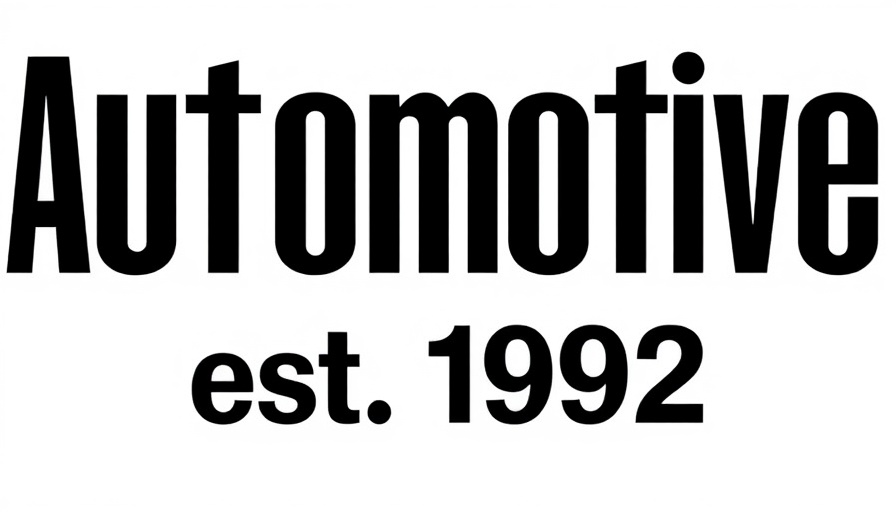
 Add Row
Add Row  Add Element
Add Element Maruti Suzuki's 2 Million Production Milestone: What It Means for Dealerships

0 Views
0 Comments

Transform Your Dealership: 4 Misguided Beliefs That Hold You Back
Update Recognizing Misguided Beliefs in Leadership Effective leadership is often shaped by our beliefs, particularly in the fast-paced environment of auto dealership management. Although certain mindsets may seem logical, delving deeper reveals that these "feel right" beliefs can hinder operational success. Addressing common misconceptions can create a culture that not only promotes staff growth but also enhances customer satisfaction. Shifting Mindsets: The Myth of Changing People One of the most prevalent yet misguided beliefs is the idea that you can change people. This belief can lead to frustration and resistance among team members. Instead of attempting to alter others, successful dealership managers should foster an environment where individuals are encouraged to set their own goals and strive for personal growth. Offering guidance in identifying useful behaviors can lead to newfound motivation among employees, enhancing overall performance and engagement within the dealership. Redefining Productivity: Hard Work is Not Always the Answer Another common misconception is that working harder inevitably leads to better results. In the dynamic landscape of auto sales, action bias often leads leaders to prioritize urgent tasks over strategically important activities. Managers should challenge their teams by encouraging them to focus on long-term benefits rather than merely addressing pressing issues. Asking employees how they can tackle challenges independently cultivates empowerment and accountability, crucial elements in effective dealership operations. The Power of Gratitude: Fueling Employee Morale Gratitude is often reserved for special occasions, yet frequent expressions of appreciation can significantly impact team morale. Research shows that teams who foster a culture of recognition exhibit higher levels of satisfaction and productivity. Dealership managers should make a habit of acknowledging individual team members—whether publicly or privately. A simple phrase like, "One thing I admire about you is..." can inspire a positive environment. Addressing Challenges Head-On: The Danger of Minimization It’s easy to adopt the sentiment that "it’s not that bad" concerning recurring issues within a dealership. However, minimizing problems can ultimately exacerbate them. Encouraging open dialogues about challenging topics—and doing so with an optimistic outlook—can unlock innovative solutions. Dealership managers can ask their teams to identify recurring issues and create a safe space for discussing these concerns, leading to a healthier organizational culture. Final Thoughts: Beliefs Shape Actions The beliefs we hold as leaders can significantly influence our team's effectiveness in a dealership setting. To thrive, leaders must focus on personal and team growth by confronting incorrect beliefs and fostering an environment of collaboration and empowerment. By doing so, not only are operational efficiencies improved, but customer satisfaction will also see a natural enhancement. Evaluate your leadership beliefs today. What belief requires adjustment to create a more engaged and productive workforce? Seeking growth in oneself is the first step towards cultivating a transformational dealership culture.

Unlock Smart Teams in Dealerships: 3 Practices You Must Implement
Update Unlocking the Power of Smart Teams: Essential Practices for Dealerships In the fast-paced world of automotive dealership management, forming smart teams that excel is not just advantageous; it's critical. As evidenced by various studies, including Google’s exploration of group dynamics, smart teams outshine individuals every time. To transform your teams into high-performing units, consider implementing three key practices that foster collaboration, innovation, and growth. 1. Expand the Lens: Cultivating Broader Perspectives In dealership settings, it’s imperative to adopt a holistic view of challenges. Encourage your team to consistently pose the question: “What are we missing?” This approach cultivates an environment where a devil’s advocate role rotates among team members, promoting diverse viewpoints during discussions. Moreover, during conflicts, pivot the focus towards learning by asking, “What can we learn from this situation?” This shift enhances critical thinking and problem-solving capabilities, essential for navigating the competitive automotive market. 2. Turn-Taking: Elevating Every Voice A common pitfall in team dynamics is conversation domination by a select few. Implement a simple yet effective turn-taking strategy to ensure every voice is heard. For instance, passing around a designated item, like a rubber duck, grants speaking rights, ensuring that quieter team members can articulate their insights. A structured method to allow for pauses after speaking can enhance the entire team’s ability to process ideas thoroughly. Remember, engaging novice team members can yield unexpected creative solutions to sales challenges. 3. Curiosity as a Driving Force Embracing a culture of curiosity encourages team members to question the status quo. Hold ‘curiosity rounds’ during meetings where team members can ask “how,” “why,” and “what if” questions. By honoring these inquiries and welcoming diverse ideas, teams can significantly boost their problem-solving capabilities and innovation. As a directive, conclude meetings with questions like, “What made you think differently today?” This practice reinforces a learning mindset critical to dealership growth. Why Smart Teams Matter for Dealership Success Smart teams excel not by chance but through intentional practices. They embrace confusion without ridicule and respond to feedback constructively. By fostering an atmosphere where curiosity thrives, dealerships can create a culture that not only enhances operational efficiency but elevates customer satisfaction—a key driver in the automotive industry. Investing time in building smart teams ultimately leads to a more resilient, adaptable workforce capable of navigating the evolving landscape of automotive sales. What practices will you implement to foster smarter team dynamics in your dealership? Take action today to build the teams you’re proud to lead!

Maruti Suzuki Expands Solar Capacity: A Leap Toward Eco-Friendly Car Manufacturing
Update Maruti Suzuki’s Commitment to Sustainability Shines Through Solar Expansion In a significant move towards enhancing renewable energy usage, Maruti Suzuki India Limited (MSIL) has announced an expansion of its solar capacity by 30MWp. This development includes the commissioning of a 20MWp solar facility at its new Kharkhoda plant and an additional 10MWp capacity at the existing Manesar facility. As a result, the company’s total solar capacity has risen dramatically from 49MWp to 79MWp in just one year, underscoring its commitment to green initiatives in alignment with Suzuki Motor Corporation’s Environment Vision 2050 and India’s renewable energy focus. Why Renewable Energy Matters in the Auto Industry The automotive industry faces increasing pressure to adopt sustainable practices as consumer awareness about climate change grows. Maruti Suzuki’s solar expansion not only aligns with governmental policies but also reflects a broader urgency among manufacturers to invest in renewable energy. The global shift towards sustainability is not merely a trend; it is rapidly becoming a necessity for survival in a competitive market. By transitioning to greener practices, companies can reduce operational costs over time while also contributing to environmental goals, such as the United Nations’ Sustainable Development Goal #7, which aims to ensure access to affordable, reliable, sustainable, and modern energy for all. Will Solar Power Become the Norm in Automotive Manufacturing? As Maruti Suzuki plans to achieve a total solar capacity of 319MWp by FY2030-31, backed by an investment exceeding INR 925 crore, other automotive manufacturers are likely to take heed. The company’s ambition reflects a significant trend where automakers increasingly integrate renewable solutions into their operations. Such moves could lead to a cascading effect across the industry, inspiring a collective shift towards sustainable manufacturing methods where solar energy becomes a standard instead of an option. Environmental Impact and Beyond: The Business Case for Solar Power Investing in renewable energy sources like solar power not only serves the environment but also strengthens a company's market position. Maruti Suzuki’s focus on enhancing its renewable energy consumption from current sources aims to reach 85% by FY2030-31. This shift not only fulfills a corporate social responsibility but can also improve brand loyalty among consumers who prioritize environmentally friendly practices. Dealership owners and managers should consider how embracing such sustainable practices can differentiate their businesses in an increasingly eco-conscious consumer landscape. Consumer Responsibility and the Future of Automotive Sales Training With the automotive industry's transition to sustainable energy, it is crucial for sales teams to be knowledgeable about these advancements. Training programs that incorporate information about eco-friendly practices and the benefits of solar energy in manufacturing can empower auto sales professionals to better engage with consumers. This enhances not only their credibility but also their ability to meet customers' evolving preferences for greener alternatives. As Maruti Suzuki continues to lead by example, dealership owners should reflect on how incorporating sustainability into their training programs might influence customer perceptions and sales outcomes. An informed sales team can drive conversations about sustainability, framing it as an integral part of the automotive experience rather than a mere afterthought. In conclusion, Maruti Suzuki's proactive approach towards solar capacity expansion is a pivotal step towards creating a cleaner, more sustainable future in the automotive industry. Leveraging these developments in sales training can offer progressive dealerships a competitive edge, aligning their business objectives with the necessary push for environmental sustainability. Consider how your dealership can adopt these insights today!
 Add Row
Add Row  Add Element
Add Element Write a small description of your business and the core features and benefits of your products.
 Add Element
Add Element COMPANY
 Add Element
Add Element (215) 407-5174
AVAILABLE FROM 8AM - 5PM
City, State
32 Tanyard Rd, Richboro, Pennsylvania, 18954,
United States
 Add Element
Add Element ABOUT US
Larry J. Feldman is a 30-year veteran of the auto industry, having been an award-winning Cadillac Salesperson, General Manager, and Dealer Principal. He has owned and operated Career Changers USA since 2012. Larry was also a keynote speaker at AGWS's 15th anniversary meeting, a leader in the auto warranty sector.
 Add Element
Add Element © 2025 CompanyName All Rights Reserved. Address . Contact Us . Terms of Service . Privacy Policy




Write A Comment